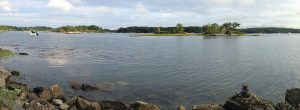
Baker and Jonathan Nason were the sons of Richard Nason and Sarah Baker of Pipe Stave Landing in what is now South Berwick, Maine. Baker Nason was born around 1642. Jonathan Nason was born around 1645. These birth dates are probably close but may not be accurate. In court records, Jonathan was described as Baker’s older brother. At the time of the killing both men were in their 40s, married and had several children.
On March 1, 1691 or 1692 Baker Nason killed his brother, Jonathan Nason, with a canoe paddle. They were traveling together along the Piscataqua River. He was charged with murder, claimed self-defense, and was acquitted. There are few court records and almost no information on the incident. We don’t know what provoked the attack, the particulars of their relationship, or why Baker was found not guilty. 
In April 1693, a special Court of Oyer and Terminer was appointed to hear the case. A very brief record is included in Province and Court Records of Maine, Vol. IV, The Court Records of York County, page 10-11, April 1693: “The Grand Jury passing upon the Indictment against Baker Nason brought in their verdict and found that Baker Nason Did Kill his brother Jonathan Nason.” In the same volume for July 4, 1693 for the Court of Sessions of the peace, it states “Whereas Baker Nason was Indicted to this court for wilfully murdering his brother Jonathan Nason…The Jury finds him not Guilty.”
Samuel Sewall, a contemporary of the brothers and a Boston magistrate, member of the Governor’s Council and diarist, wrote about the trial: Sewall Diary, March 11, 1692. “Capt. Wincoll brought us the Jury’s verdict about Baker Nason’s killing his elder Brother Jonathan Nathan (sic) with his Oar in the Canoe in Pascataqua River: and asks advice whether to keep him there, or send him to Boston-Prison. Seems to have done it in his own defense March 1, 1691/2.” Sewall is famous—or infamous–as the 1692-93 Salem witch trials judge. In fact, Sewall makes his first notation about the Salem witch accusations a few days after the Nason entry. 
In his book, American Homicides, Randolph Roth described the killing as an accidental death. Baker Nason and Jonathan Nason got in an argument while they were paddling a canoe in the Piscataqua. Jonathan swung his paddle at Baker, and Baker swung back, killing Jonathan by accident.
Having canoed a lot in wilderness areas in my youth, that kind of “accident” isn’t plausible. An argument that violent and physical would probably dump one or both men out the canoe, not something you would want to do in a Maine winter. More likely the argument was on shore, and the paddle was used to fend off an attack. Baker hit Jonathan hard enough to crack his skull or caused him to fall and hit his head against rocks.
My sense is the brothers were arguing about land and the estate of their father. In 1692, Richard Nason was 86 years old—ancient in that era. He lived to be over 90 years old, dying on December 22, 1696. Life was hardscrabble and tough in the forest wilderness, and people needed to be that way, too, to survive. Perhaps the brothers didn’t like one another. Maybe there was a sibling rivalry–Baker was an executor of Richard Nason’s will and a chief beneficiary. A remark or accusation may have ignited a fatal encounter.
Baker Nason was the namesake of John Baker, his grandfather, a man known for his short fuse and aggressive behavior. 17th century York County court records have numerous John Baker mentions. He paid fines for drawing his sword and for running after Indians; beating up his son-in-law (Richard Nason); throwing a fire shovel at his daughter (Sarah Baker); and “fyned Ten shillings” for “thretning William ffurber saying he would kill him if he were hanged for it.” Now I know where my father, Eugene Nason Doherty, and I both inherited our tempers.
Baker Nason, a carpenter, died in Berwick, Maine in 1729.

[…] based on his wife remarrying in 1687) although some accounts cite the Salmon Falls Raid in 1692. Jonathan Nason was killed by his brother, Baker, with a canoe paddle when they were traveling on the Piscataqua River. Baker […]